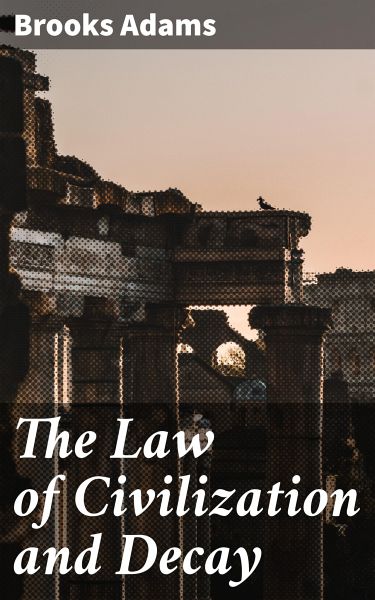
The Law of Civilization and Decay (eBook, ePUB)
Enriched edition. The Patterns of Societal Rise and Fall: An Analytical Exploration
Kommentar: Holloway, Linus / Redaktion: Good Press
Versandkostenfrei!
Sofort per Download lieferbar
0,49 €
inkl. MwSt.
Weitere Ausgaben:

PAYBACK Punkte
0 °P sammeln!
In "The Law of Civilization and Decay," Brooks Adams meticulously explores the cyclical nature of societies, examining how civilizations rise, flourish, and inevitably decline. Through a blend of historical analysis and social theory, Adams articulates a compelling argument that civilization is governed by immutable laws rooted in economics and the human condition. His literary style is characterized by a rigorous yet accessible prose that integrates philosophy, history, and sociology, shedding light on the intricate interplay between material progress and moral decay. The work positions itsel...
In "The Law of Civilization and Decay," Brooks Adams meticulously explores the cyclical nature of societies, examining how civilizations rise, flourish, and inevitably decline. Through a blend of historical analysis and social theory, Adams articulates a compelling argument that civilization is governed by immutable laws rooted in economics and the human condition. His literary style is characterized by a rigorous yet accessible prose that integrates philosophy, history, and sociology, shedding light on the intricate interplay between material progress and moral decay. The work positions itself within the broader intellectual context of the late 19th century, engaging with contemporaneous theories of historical materialism and social evolution. Brooks Adams, a member of the distinguished Adams family and a keen observer of societal dynamics, was significantly influenced by the zeitgeist of his time, particularly the rapid industrialization occurring in America. His background as a historian and a lawyer enriched his understanding of the moral implications of economic systems, prompting him to interrogate the reasons behind societal decay as much as its achievements. Adams's profound concerns about democracy, capitalism, and their ramifications are central themes that permeate his work. I highly recommend "The Law of Civilization and Decay" to anyone interested in the foundational questions of history and sociology. Adams's insightful observations and compelling arguments invite readers to reflect critically on the patterns of civilization and the lessons they hold for our present and future. This book is a significant contribution to the discourse on societal dynamics and remains thought-provoking in today's context. In this enriched edition, we have carefully created added value for your reading experience: - A succinct Introduction situates the work's timeless appeal and themes. - The Synopsis outlines the central plot, highlighting key developments without spoiling critical twists. - A detailed Historical Context immerses you in the era's events and influences that shaped the writing. - A thorough Analysis dissects symbols, motifs, and character arcs to unearth underlying meanings. - Reflection questions prompt you to engage personally with the work's messages, connecting them to modern life. - Hand-picked Memorable Quotes shine a spotlight on moments of literary brilliance. - Interactive footnotes clarify unusual references, historical allusions, and archaic phrases for an effortless, more informed read.
Dieser Download kann aus rechtlichen Gründen nur mit Rechnungsadresse in A, B, BG, CY, CZ, D, DK, EW, E, FIN, F, GR, H, IRL, I, LT, L, LR, M, NL, PL, P, R, S, SLO, SK ausgeliefert werden.













